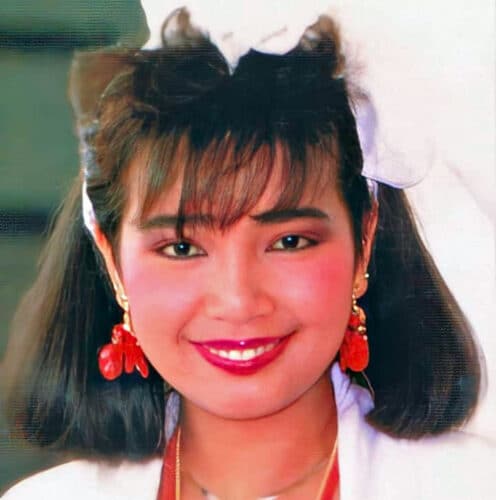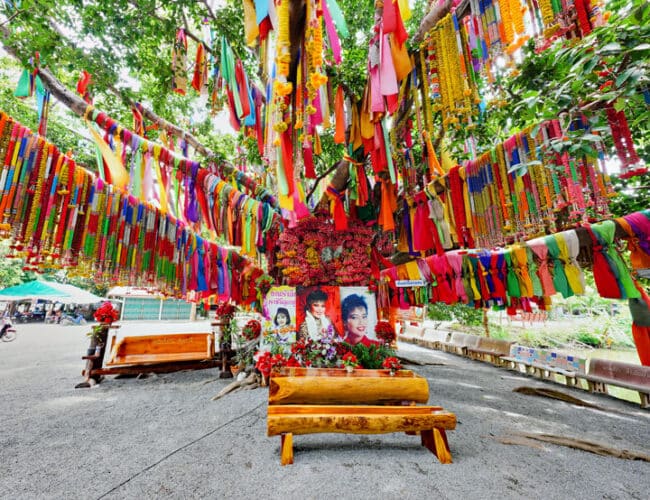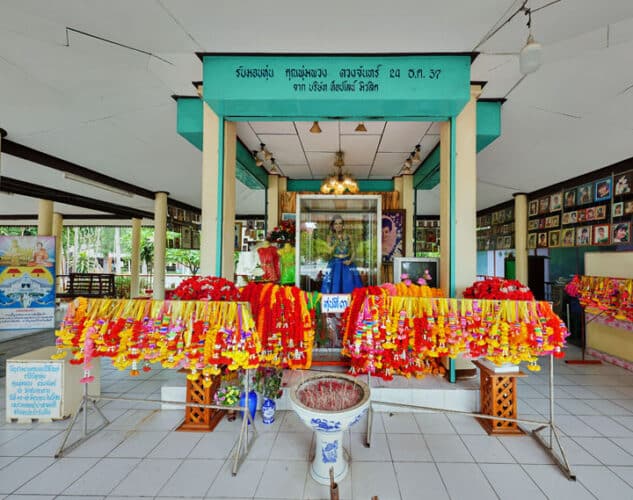Phumhuang 'Pheung' Duangchan, the queen of life song

Phumhuang 'Pheung' Duangchan (Photo: Wikipedia)
I know very little farang who are really charmed by Luke Thung, a Thai music movement that originated in the fifties of the last century and to this day, especially in Isaan, is an extremely popular genre that can best be compared in terms of content with the tear-jerking songs of the Dutch Polderpop. Even if it is about grazing buffalo, sweating farmers and muddy rice fields.
I live in a fishing hamlet along the Mun River where the village elder finds it necessary to get up every morning between roughly 07.00:08.30 and XNUMX:XNUMX. at full volume through the loudspeakers next to his cabin for the education and entertainment of the locals Luke Thung to let it blare… A musical attention that I don't always appreciate, but my spouse, who is a born Isan, still loves it and even thinks it is necessary to occasionally add vocals to what has been heard and thus the peace of mind of really putting myself and my Catalan Shepherd Sam to the test….
The queen of the Luke Thung is without a doubt the much too early deceased Phumphuang 'Peung' Duangchan whose life story at times closely resembles one of the dramatic life songs that she managed to interpret with verve. She was born Ramphueng Chit-han on August 4, 1961, to a poverty-stricken farmer's family in an unnamed shack somewhere in the Hankha district of southwestern Chai Nat province in central Thailand. Her childhood, fifth in a family of no less than twelve children, was far from rosy. She had to make a living and that is why she only went to school until she was eight, after which she started cutting sugar cane or being hired out as a day labourer. Her failed school career was the reason why she was almost illiterate. But she did have the gift of remembering texts she heard. And this, in combination with an above-average singing voice, was her salvation.
At the age of twelve she received singing lessons and learned not only dozens Luk Thung-songs by heart, but she also practiced the accompanying dance steps and choreography. She started participating in local and regional singing competitions as a traditionalist Luk Thung-singer. Her performances did not go unnoticed. When she was fifteen, she was discovered by a touring band who came to play at a local festival. She took them to Bangkok where she was lucky enough to meet Kru Lop Burirat, a very creative songwriter, composer and producer who experimented with modernizing the Luke Thung by adding an electronic beat to it. This formula clearly caught on with the general public and after the phenomenal success of her first album 'Aue Hue Lor Jang' and a few successful television appearances, Phumphuang Duangchan suddenly became the figurehead of this innovative genre.

The Wat Thap Kradan in Supan Buri is a museum in memory of the famous Thai folk singer Phumphuang Duangchan. Photo: kwanchai/Shutterstock.com
From then on it all moved fast and her life seemed like a 'of Pauper to Princess'-fairy tale because her style, a mix of the traditional LukThungmusic with disco and danceable pop music certainly did her no harm. Or as she herself sang in one of her many hits: 'I came to the city to become a big star/ It was hard, but I survived….” Her undeniable singing talent, good looks and extravagant, sexy outfits made her a cult figure and one of the first real Thai pop icons. Many of her songs were about herself. About young women who fled the miserable existence in the countryside to look for happiness in the city. About the longing for happiness and success, but also about the unquenchable nostalgia for the birthplace…
However, her success story also had a very dark downside. Her first husband was a notorious loser who cheated on her with the regularity of a clock and who eventually left her for a girl next door. As if that wasn't enough, he returned after this relationship had also come to an end and moved in with one of Phumphuang's sisters. His amorous escapades came to an end when he was killed in a fit of rage by one of Phumphuang's brothers. This brother ended up behind bars for 15 years while another brother committed suicide after being rejected by a singer friend…. In 1984, Phumphuang Duangchan got married again. This time with the singer Kraisorn Saenganun. A year later their son Pakkawat Pisitwuthiratch was born. Her somewhat turbulent life has meanwhile been widely spread in the tabloid press, but it was mainly the abuse of trust by all kinds of dubious people from her immediate environment, including her brand new husband, that killed her. Crafty swindlers took advantage of her naivete and credulity to ensure that when she fell seriously ill she was penniless and unable to afford her medical treatment.

Wat Thap Kradan in Supan Buri, a museum dedicated to the memory of Phumphuang Duangchan. Photo: kwanchai/Shutterstock.com
She died of renal failure on June 13, 1992 at Buddhachinaraj Hospital in Phitsanulok. Some sources claim that this death happened in not entirely clear circumstances, but I have not found any concrete information about this. But even these claims have undeniably contributed to the myth-building around this remarkable artist. By the time she died she had recorded over 600 songs on 60 albums and starred in 10 films. It wasn't until her funeral that it became clear how immensely popular she had been. An estimated 200.000 mourners — including Thailand's King Bhumibol — flocked to Wat Taprakadan in Suphanburi to honor her memory.
The biographical film was released in 2011 The Moon from Bhandit Thongdee about her wonderful yet tragic life. She is appreciated and recognized by the current generation of Luk Thung artists 'the girl who puts the spice into Luk Thung'… And that is, in my opinion, more than justified.


Good of you to bring this singer to the attention, Lung Jan. Every real Thai knows her.
But the term 'Het Levenslied' is more applicable to songs with more political and socio-economic content, such as by Carabao.
Phumphuang 'Pheung' Duangchan. Phumhuang means 'Beautiful Woman' and Duangchan is 'The Moon'. Her nickname Peung means 'Bee' or 'Honey'.
Here's a song from her: 'The man of my dreams'. The video and a link to the translation in English. Watch, listen and read!
https://www.youtube.com/watch?v=e2O2L6yLR5A
Hello Tino, no you are wrong. The term Levenslied has absolutely nothing to do with politics. Far from it.
A song of life is a song that sings about things from the dark side of life in particular. It usually has a moral and conveys a sentimental or melodramatic feel. It has the standard structure of a chorus and verses. In the Netherlands, from the 50s to the 80s, the genre was mainly dominated by producers Johnny Hoes and Pierre Kartner, who for artists such as Zangeres Zonder Naam, who was even proclaimed "the queen of the song of life", Jantje Koopmans and Corry and de Rekels, Eddy Wally produce successful records. In the 80s, the interest of the major media in the life song declined, although André Hazes became a new star with nine top ten hits. Koos Alberts also scored incidental hits, but otherwise hardly any new artists broke through to the general public. It was mainly the illegal pirate stations and small record companies specializing in the song of life that were the most important supporters of the song of life from this time on. The remarkable success that Frans Bauer has experienced since the XNUMXs came about through this circuit. (Source Wikipedia).
I cannot remember that interpreters of the Dutch song of life have ever sung about politics.
Very nicely written. dear Peter, and it will all apply to the Netherlands as well.
In Thailand, however, the 'Life Song' เพลงเพื่อชีวิด phleng pheua chiwit as performed by the bands Caravan and Carabao simply has a different meaning. That's here:
https://en.wikipedia.org/wiki/Caravan_(Thai_band)
Quote:
Caravan (Thai: ฅาราวาน, RTGS: Kharawan),[1] is a Thai folk-rock band that formed out of the 1973 democracy movement. It launched the phleng phuea chiwit (เพลงเพื่อชีวิต, lit. “songs for life”) genre that has since been popularized by Carabao.
So she is called 'the queen of the Luk Thung'. Luk Thung means: 'Child of the Rice Fields'. And you are of course right that it is very similar to the Dutch 'Levenslied'.
Here's another song from her. That's how she performed
https://www.youtube.com/watch?v=OBnZ7GpvweU&t=71s
'
เพลงเพื่อชีวิด I think means 'music about life' that's something else. What you may be referring to are protest songs.
A protest song is a song that mocks society with the aim of changing it. Well-known protest singers are Woody Guthrie, Pete Seeger and Bob Dylan, and in the Netherlands and Belgium also Armand, Boudewijn de Groot and Robert Long (source: Wikipedia)
Hi Tino, I have seen that Kharawan is often written as ฅาราวาน shouldn't this คาราวาน
to be?
Dear Jan and Tino, as far as the names are concerned, I do have some objections to the brands. Her stage name is
พุ่มพวงดวงจันทร์,Phôem-poewang (beautiful woman) Doewang-tjan (moon). Call sign ผึ้ง, phûng (a bee). That is a commonly used abbreviation of the nickname น้ำผึ้ง, nám-phûng (honey).
And she was born as รำพึงจิตรหาญ, Ram-phung (reflect, contemplate) tjìt-hǎan (brave, the brave).
In general, I am not a big fan of life songs, or those that come from the Netherlands or Thailand. You don't make me happy with an evening full of life songs. But of course there are some special artists, bands and songs (in sound or text) that are certainly worth listening to.
Anyway, thanks for the short biography Jan. It is a pity that all kinds of injustices have been done to her and many with her. That is immediately a source of inspiration to draw attention to sadness, pain and other abuses, so in a way it is nice that something negative can be converted into something beautiful and good.
Sad that such a talented woman dies so young, 31 years young!
And then have to die because there was no money to pay for the hospital.
Those who did this should be ashamed of themselves!
The real reason for her death was!
AIDS (very susceptible to everyone at that time).
Inflamed by her adulterous husband.
I knew her personally, and she was a very loving person.
Regards John,
Hi John, can you tell us a bit more about your relationship with her.
Phumhuang takes me back to the 90s, and I think it would be great to hear from a Dutch person who knew her.
Thank you, Regards karel2
Look, I like to read this, after some googling I also came across the English version of this story. I don't understand a word of the lyrics, but I've loved listening to the music for years, even at home in the Netherlands I regularly put on an album with Luk Thung or Mor Lum, and once in a while Mor Lum Sing. The albums can also be purchased almost “for free” at eThaiCD.com Strangely enough, I haven't really listened to Pheung very closely yet. I stuck more with Jintara Poonlarp (her older albums) and especially the somewhat hoarse voice of Siriporn Umpaipong.
Normally “folk music” is not my thing at all, Irish Folk at most. And listen especially to the English-language solo artists from the 80s and 90s, between the hundreds of CDs there is at most a stray CD by Hazes and Willie Alberti. But it is especially the peace that Luk Thung / Mor Lum gives through the “pan flute” (?) and Phin guitar that makes it so wonderful to listen to.
Heard her voice for the first time long ago at Loi Khratung party in Amsterdam North, played back by a Katheuy. Done perfectly
Song was Ngeunnne mi mai, Still love it and is one of two songs I saved in Line.
This one is in my favorites on YouTube
https://youtu.be/ynguKZcPT9c